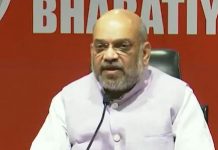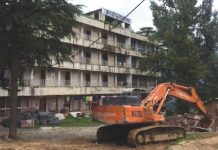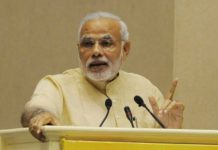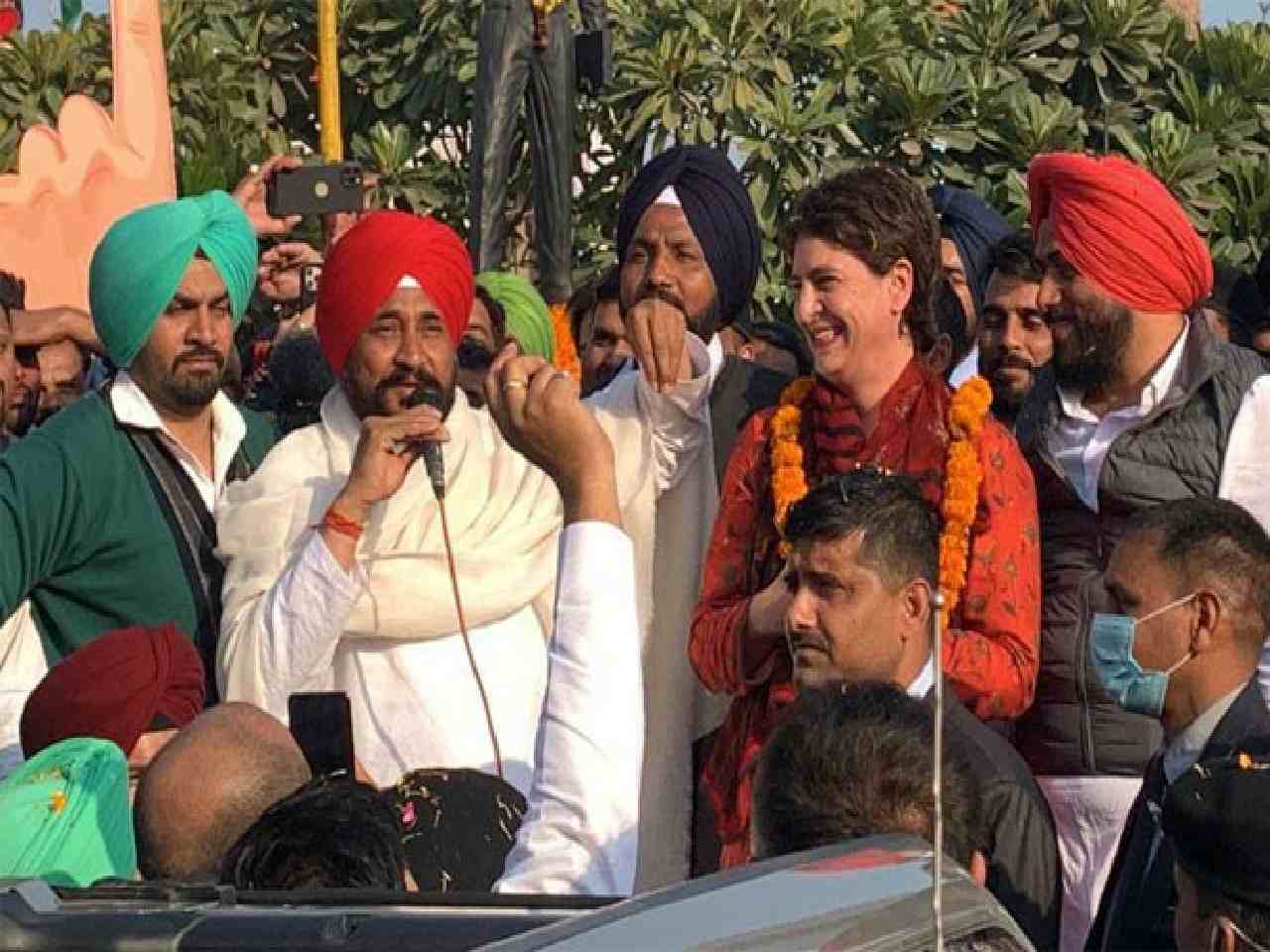
Though assembly poll in Punjab are over, the political parties in fray are on the tenterhooks. The 71.95% voter turnout – lowest in the past 15 years – has only bared the lack of enthusiasm among the electorate despite it being the state’s first multi-polar election, reports Rajesh Moudgil
This assembly election in Punjab has had many firsts. It was a multi-corner fight among Congress, Aam Aadmi Party (AAP), Shiromani Akali Dal (SAD)-Bahujan Samaj Party (BSP)-alliance, the BJP-Punjab Lok Congress (PLC)-SAD (Sanyukt)-combine and the farmers’ outfit Sanyukt Samaj Morcha (SSM). Punjab had seen only bi-polar polls between Congress and SAD since its re-organisation in 1966, except for 2017 when AAP made it a triangular contest.
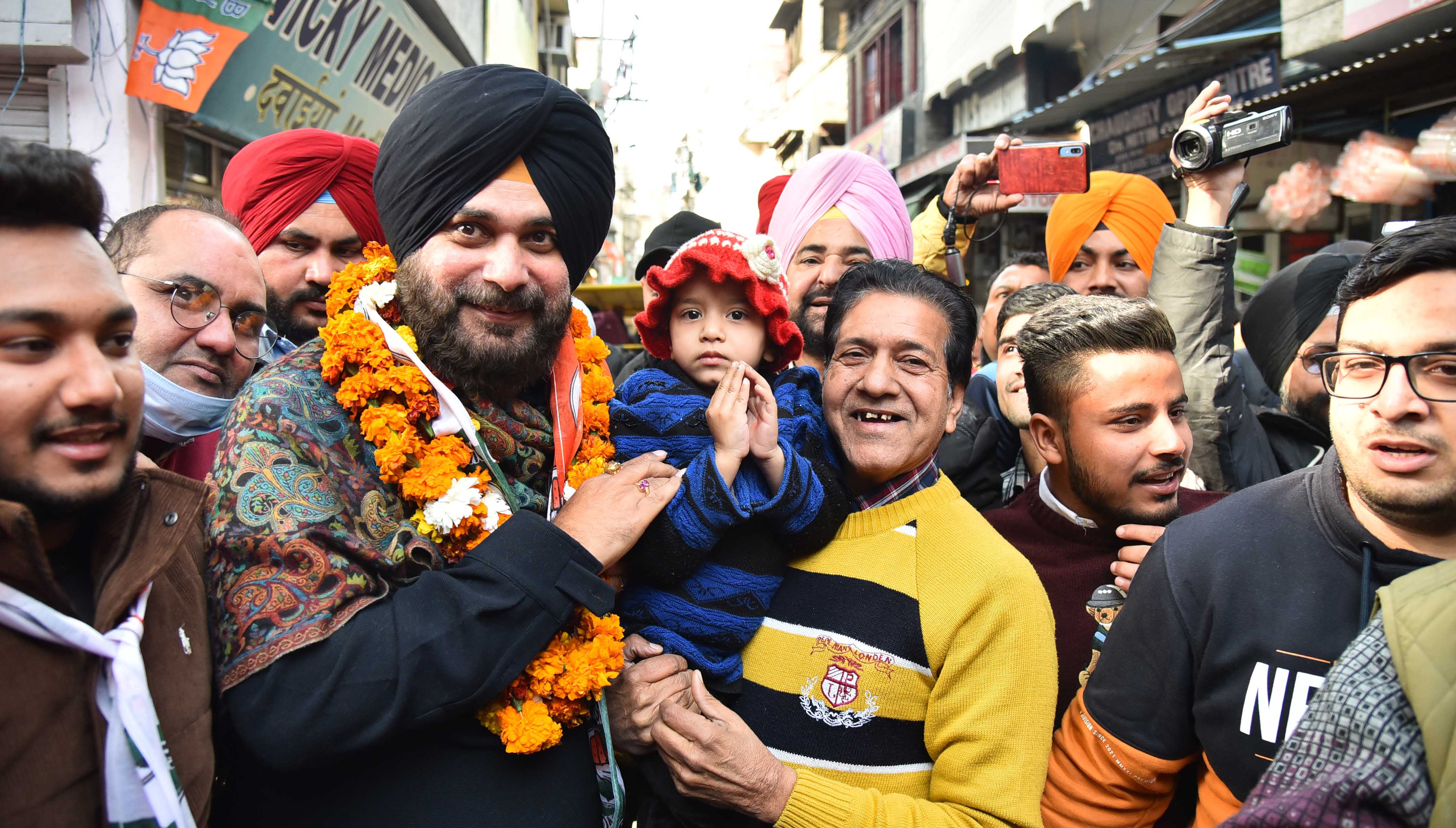
It is also for the first time that the state election had a Dalit chief minister Charanjit Singh Channi and also first time that the two of the four political majors – Congress and AAP – had announced their chief ministerial candidates, Channi and Bhagwant Mann, respectively.
While BJP has fought its maximum of 65 seats with an alliance with PLC and SAD-(Sanyukt), it is also the first time that a farmers’ outfit Sanyukt Samaj Morcha (SSM) was also in the fray. Results would be out on March 10. Going whole hog in the polls all the main parties vied with each other to woo the voters promising a host of freebies.
Congress it’s own enemy
With the Congress rebels having contested its own party candidates at several seats, severe damage stares at the party in this election. In at least 10 assembly constituencies, some of the Congress leaders – who have been denied tickets for themselves or their favourite ones – have fought as independents or joined the rivals.
There is chief minister Channi’s brother Dr Manohar, to begin with, who has fought from Bassi Pathana constituency (district Fatehgarh Sahib) against Congress’ sitting MLA Gurpreet Singh.
Likewise, the Congress’ four-time MLA Amrik Singh Dhillon has fought as independent from his Samrala (district Ludhiana) seat after the Congress decided to replace him with Rupinder Singh Raja Gill, a prominent realtor from nearby Khanna segment and who is the son of former minister Karam Singh Gill.
Another seat where Congress is set to face damage is at Tanwandi Sabo seat (district Bathinda) where the three-time former MLA Harminder Singh Jassi, a relative of jailed Dera Sacha Sauda head Gurmeet Ram Rahim Singh has contested against party candidate Khushbaz Singh Jattana.
Also, the Congress’ sitting MLA at Nawanshahr seat, Angad Singh, has contested as independent after being replaced with Satvir Singh Palli Jhikki. The former was denied a ticket by state Congress as his wife Aditi Singh, MLA from Rae Bareli in Uttar Pradesh, joined the BJP.
Notably, the Cabinet minister Rana Gurjeet’s son Rana Inder Partap Singh, has fought from Sultanpur Lodhi in Kapurthala district as an independent against the party candidate Navtej Singh Cheema. It may be recalled that the minister is the Congress candidate from Kapurthala.
Meanwhile, sources in the party say that former state Congress president Mohinder Singh Kaypee and former minister Jagmohan Singh Kang were also annoyed with the party’s selection of candidates in their respective seats.
Also, there are a few other Congress leaders who could damage the party. They include Amarjit Singh Tikka, his nephew Sukhwinder Singh Bindra who wanted tickets for Jalandhar (south) and Sahnewal (Ludhiana) seats, respectively, but were denied. The firebrand leader and national secretary of Youth Congress, Daman Bajwa was denied a ticket for Sunam (district Sangrur), and party insiders say she could cause a dent to the party candidate. The trio had also joined BJP.
These rebels are aside from other factors which had potential to weaken the party from within; bitter infighting between Sidhu and Channi supporters despite the fact that they jointly rebelled against Capt Amarinder Singh. Sidhu’s offensives against Channi sent out wrong messages about the party’s infighting and weakened Channi’s standing.
Also, the manner in which the talks to have a stop-gap Hindu chief minister after the humiliating exit of Capt Amarinder Singh was trashed by a senior party leader, did put the Congress party in poor light. Sunil Jakhar who is arguably the tallest Hindu leader in Punjab Congress also vented his pain and anger on this.
It’s make or mar for many
Even though there were a total of 1,304 candidates including 117 each of all the main political parties – Congress, Aam Aadmi Party (AAP), the alliance of Shiromani Akali Dal (SAD)-Bahujan Samaj Party (BSP), and the alliance of BJP, former two-time chief minister Capt Amarinder Singh-led Punjab Lok Congress (PLC) and SAD (Sanyukt), an SAD splinter group, this election has the potential of making or breaking the political standing of several key players.
Will Channi deliver?
The ruling Congress had in a surprise move in September last appointed the three-time MLA from Chamkaur Sahib (district Rupnagar) Channi as the state’s first Dalit CM after the exit of Capt Amarinder Singh following bitter bickering in the party. The Congress’ second surprise came when he was named as chief ministerial candidate which only aggravated the factionalism within.
A mild-mannered Channi, however, aptly played his “humble background’’ and a Dalit leader cards well and broad-shouldered the flak over PM security breach and ED raids at his nephew’s premises in connection with illegal sand business using the “victim’’ card. He is also contesting from Bhadaur (reserved) seat, beside his original seat, Chamkaur Sahib. However, political scientists foresee the possibility of the consolidation of upper and dominating castes against Congress.
Sidhu locked in a battle of prestige
The cricketer-turned-politician, Navjot Singh Sidhu, a three-time MP who fell out of the SAD-BJP alliance after he was denied ticket in 2014 though was nominated to Rajya Sabha later had joined Congress in 2017 and won Amritsar (east) assembly seat. As a minister in Capt Amarinder Singh’s government, he was one of his main detractors that led to a humiliating exit of Capt Amarinder Singh. Locked in a high-stake battle with his enemy number one, SAD’s Bikram Singh Majithia in the same seat after the latter accepted his challenge to fight from this seat alone. Sidhu has too many sworn enemies in this election like never before.
Mann: Will he have the last laugh?
A two-time MP from Sangrur, the comedian-turned-politician Bhagwant Mann, who is the state president of the Aam Aadmi Party (AAP) and also party’s CM face is striving to enhance his stature while fighting from Dhuri assembly seat. He got into politics in 2012 when he unsuccessfully contested from Lehragaga assembly seat on People’s Party of Punjab (PPP) ticket though joined AAP afer PPP struck an alliance with the Congress. The major opposition that stares at him is AAP’s control from Delhi.
Sukhbir keeps his flock together
Having successfully kept the party flock together despite intense tug-of-war between several political parties, SAD chief and former deputy chief minister Sukhbir Singh Badal has struck an alliance with Bahujan Samaj Party (BSP). He was first to make all his poll moves ahead of others he also kept up his fight against his rivals, despite the absence of active support of his father, the SAD supremo, Parkash Singh Badal, 94, who has moved into the backdrop due to his age.
Capt trying to guard his turf
The two-time chief minister Capt Amarinder Singh has jumped into the fray enthusiastically despite his unceremonious exit as the chief minister and from the Congress about five months ago. The scion of erstwhile Patiala princely state, Capt Amarinder Singh took no time in floating his Punjab Lok Congress (PLC) and struck in alliance with the saffron party and the SAD’s splinter group SAD (Sanyukt). He enjoys close ties with BJP top leadership including Prime Minister Narendra Modi. He fights from his home turf Patiala (urban) seat where two former Mayors are contesting against him.
Ashwani Sharma
Though a low-profile face of the saffron party, Ashwani Sharma is BJP’s warhorse. He is Punjab BJP’s president for the second time (first time in 2010) and a staunch RSS activist and former BYJM president. He was a legislator from Pathankot earlier too in 2012. The BJP party had withstood the backlash for the now-repealed farm laws under his leadership.
Burning issues put on backburner
Though the electioneering took off in January with several burning issues of the state, the same were soon overtaken by castes politics and the Dera factor till the voting day.
The January 15 breach in the Prime Minister Narendra Modi’s security during his first visit to Punjab in two years gave the BJP an ample ammunition to target the Channi-led Congress government.
Another burning issue pertaining to the spreading tentacles of drugs (“chitta’’) took to centre stage when the state government booked senior Akali leader Bikram Singh Majithia in a drug case.
Besides the issues of sacrilege attempt at the Golden Temple which reopened old wounds of sacrilege cases in the past, the issue of illegal mining and sand mafia once again got ignited with the enforcement directorate (ED) raids at the premises of Channi’s nephew. However, Channi termed it rivals’ conspiracy to trap him in the case.
Dalit politics
However, the electioneering got a major twist on February 16 on the occasion of Guru Ravidas Jayanti when the prime minister Narendra Modi visited and participated in the “shabad kirtan’’ at a Guru Ravidas temple in Delhi and the Congress’ top leaders Rahul Gandhi and Priyanka Gandhi went to the Guru Ravidas temple in Varanasi.
Their respect for the great saint notwithstanding, the political significance of their visit was not lost on anyone in the wake of the single-phase February 20 polling for 117 seats in Punjab, which has a 32 % Dalit population, the highest in the country.
It was also in this wake that all the main political parties of Punjab had rushed to the Election Commission of India in January itself seeking postponement of the assembly election which was earlier scheduled for February 14. They held that that voting would be hit as a large number of his Guru Ravidas devotees from the state visit his birthplace, Varanasi on February 16 – Guru Ravidas Jayanti. The poll was thus re-scheduled for February 20.
Dalit vote-bank is significant in Punjab politics and there are 34 reserved seats out of the total 117. Even though the state governments have almost always had Dalit ministers and in a number of other important political appointments, Dalits could never make it to the top slot, before Congress sprang a surprise by making Channi, a Dalit, state’s chief minister about five months ago.
While Aam Aadmi Party (AAP) and Congress have their respective share of Dalit votes, the SAD had last year joined hands with the Bahujan Samaj Party after snapping ties with its old ally, BJP, over now-repealed farm laws and announced that if elected they would have a Dalit deputy chief minister and a Hindu deputy CM.
However, despite being a huge number, Dalits continue to be a divided house in the political matrix in Punjab.
Politics over ‘Bhaiya’ comment
Another issue that altered the electioneering discourse near the polling day was chief minister Channi’s comment against “bhaiyas’’ (migrants from UP, Bihar) suggesting that the state would not allow “bhaiyas’’ to enter the state and rule over us.
All the rival parties BJP and AAP were quick enough to lash out at Congress over Channi’s remark, forcing him to issue a clarification.
Channi clarified that his statement was being misconstrued and that he had love for all the migrant workers who came to Punjab, toiled, and taken it on the path to development. He further specified that he was talking about people who come from outside and create disruptions here.
Unlike in the past when the migrant labour used to flock the agrarian state of Punjab during harvest season and return, there are huge pockets in Punjab where the migrant labour have not only become settlers in the paddy belt as well as industrial towns over the years but have also been impacting the poll equations.
The Dera Factor
In yet another major twist in the state politics, eyebrows were raised over the timing of granting 21-day furlough to the Dera Sacha Sauda head Gurmeet Ram Rahim, who is convict in rape and murder cases and undergoing life imprisonment in a Rohtak jail, from February 7.

Channi was first to allege after the poll that the Dera had extended support to BJP and Shiromani Akali Dal (SAD) candidates in Punjab. The political analysts held that this had dented only the AAP and Congress vote share.
It may be recalled that though the Dera is based at Sirsa in Haryana, it has a vast influence in the neighbouring Malwa region in Punjab which has 15 districts (of the total 23) and 19 reserved seats of the total 69 seats (of the total 117).
While there were talks in hush-hush initially, exactly two days ahead of the February 20 polls, the media was agog with reports that Dera
Premis (meaning Dera devotees or followers most of whom are either Dalit or poor) had got messages to vote for BJP-led alliance or Shiromani Akali Dal-BSP combine.
The Sirsa-based Dera Sacha Sauda has for long tacitly supported different political parties in Haryana, Punjab and Rajasthan where it has a huge number of its followers.
Tepid turnout
Meanwhile, political analysts opine that the low turnout suggested there was an absence of enthusiasm among the voters despite there being many burning issues, many parties and even the attractive freebies.
Political analyst Prof Pramod Kumar, director, Institute for Development and Communication (IDC), Chandigarh, held that the decline in the turnout indeed hinted that neither the Congress’ Dalit CM factor nor the AAP wave could bear the desired response of the electorate.
Stating that AAP might bag more seats this time but the so-called wave was missing in the state, Prof Kumar said that even though the voter had many options because of the crowding of the electoral space as the contests were five cornered, the voter appeared to find them no different from each other and thus got confused lacking enthusiasm to venture out of home to cast his vote.
Notably, even though the Congress fielded a Dalit chief minister to woo the Dalit voters, it appears to have failed to consolidate the Dalit vote bank – 32 % in the state – highest in the country – as the Dalit heartland, Doaba region, also witnessed a decline of nearly 6% voter turnout this time.
Prof Kumar further held that it was also said that an appeal by the actor-activist late Deep Sidhu, had spun Sikh votes in some constituencies in Malwa belt.
The Sirsa-based Dera Sacha Sauda which has huge following in about 27 assembly constituencies worked in favour of BJP and SAD to an extent. It was also said that Dera’s secret appeal after the 21-day furlough was given to the jailed Dera head, Gurmeet Ram Rahim, a convict of rape and murder, for BJP and SAD would adversely hit the AAP and Congress especially in Malwa belt.
Prof Kumar, however, sums up his analysis by opining that the declining voter turnout suggested the political parties had failed to mobilise voters.
Prof Ronki Ram, Shaheed Bhagat Singh Chair Professor in political science, Panjab University, Chandigarh, also agrees that low turnout has added anxiety of political analysts about the possible conjectures they have been spinning around much before the announcement of the elections which saw an unusual high voltage political blame-game among them and their equally surcharged supporters.
However, he says that in the given circumstances, where each and every political contestant has been talking about its political party forming the government and amidst low voting turnout, there are clear indications of a major dent to the AAP and there is a likelihood of a hung assembly.
Prof Ronki Ram adds that the Dera factor, huge sympathy for Deep Sidhu’s death in road accident did go in favour of the BJP and SAD.








